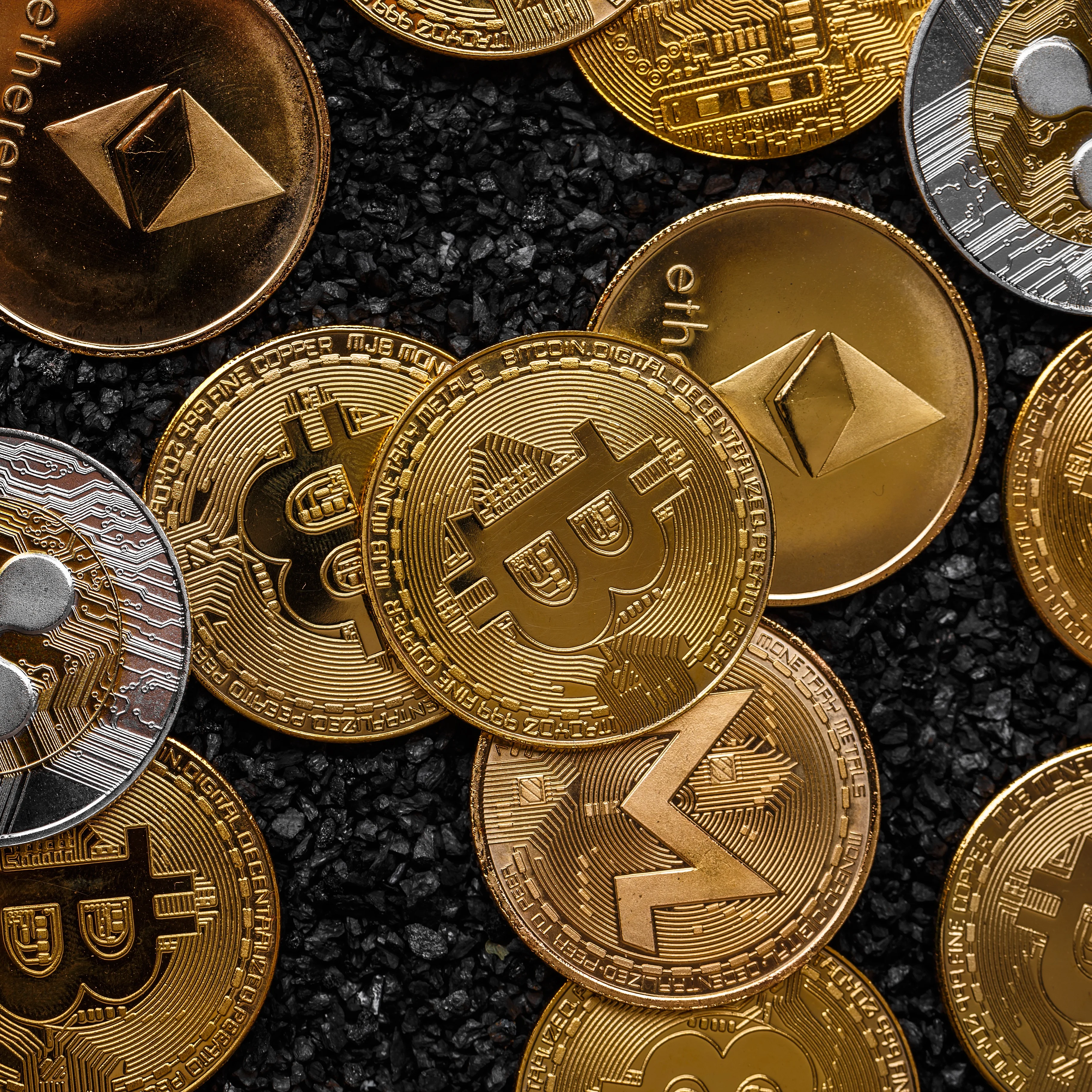Back to Blog
What Is the Difference Between Crypto and NFTs (2023)

Don Thibeau
Feb 24th, 2023
.4 min read

NFTs are an unavoidable part of the global crypto market.
Although more people know about NFTs, there's some confusion over what makes these tokens different from classic cryptocurrencies like Bitcoin.
Why are NFTs always in a separate category? After all, aren't all cryptocurrencies just virtual tokens?
NFTs share many traits with more traditional cryptocurrencies, but there's a reason they're in a class by themselves.
Understanding how NFTs contrast with other digital assets can help you understand why they're so revolutionary in crypto.
NFTs vs. cryptocurrencies: The differences you need to know
How do cryptocurrencies work?
Before getting into how NFTs differ from other cryptocurrencies, it's essential to know how crypto works.
Cryptocurrencies are digital assets that use decentralized networks of computers (aka nodes) to verify transfers. What makes crypto distinct from other digital cash platforms is that there's no central authority. Instead of relying on a bank to check these transactions, cryptocurrencies use a technology called "blockchain" to record and confirm transactions on a transparent payment ledger.

There are thousands of individual cryptocurrencies, but most fall into one of the following categories:
- Coins: A "coin" in any cryptocurrency that's native to its blockchain. For instance, Bitcoin is a "coin" because it's used on its blockchain to transfer funds and pay transaction fees.
- Tokens: By contrast, tokens are crypto projects built on top of a pre-existing blockchain. For example, the decentralized exchange Uniswap's UNI is a token on top of the Ethereum protocol.
People need Internet access and a crypto wallet to store or send whatever cryptocurrency they want. People can also trade their cryptocurrencies on exchanges (e.g., Coinbase), Bitcoin ATMs, and fiat-to-crypto transfer services (e.g., MoonPay).
Are NFTs cryptocurrencies?

Yes, NFTs are cryptocurrencies. The acronym "NFT" literally means "non-fungible token," therefore it’s in the "token" category mentioned above. In other words, NFTs are cryptocurrencies that exist on top of other blockchains. You can find all the transaction data and ownership rights for an NFT on its blockchain's payment ledger.
Most of today's NFT trading activity takes place on Ethereum, but these tokens exist on dozens of other blockchains, such as:
- Solana
- BNB Smart Chain
- Polygon
- Tezos
- Cronos
- Avalanche
How are NFTs different from other cryptocurrencies?
Even though NFTs use the same blockchains as popular tokens like UNI, LINK, or AAVE, three features set them apart.
1. Uniqueness & Ownership Rights

The "non-fungible" part of "NFT" highlights its primary difference from other cryptocurrencies. In brief, "fungibility" measures how easy it is to trade an asset 1-for-1 on the open market. For instance, fiat currencies like the US dollar are all identical, which means they're highly fungible. Since fungible assets are easy to divide into smaller units, they're convenient to trade and use for goods or services.
By contrast, a "non-fungible" asset is distinctive, non-divisible, and doesn't have a 1:1 value. Examples of non-fungible assets include paintings, autographed memorabilia, and rare books. While these items may be worth a lot of money, there's no way people can trade them as simply as fungible currencies.
How does all this relate to NFTs vs. crypto? Well, most cryptocurrencies are the virtual equivalent of fiat currencies, while NFTs are "digital collectibles." Unlike cryptocurrencies like Bitcoin, NFTs have unique and verifiable blockchain addresses, giving each of them a separate identity. These "virtual signatures" make it impossible to trade NFTs 1-for-1 as people exchange digital assets like Ether (ETH).
The uniqueness and scarcity of NFTs make them difficult to value on the open market. People soon discover a lot of bidding and bargaining involved in NFT markets versus crypto exchanges.
2. Digital Files Options
Another hallmark of NFTs is that they can be any form of digital media. From JPEGs and GIFs to MP3 files and video clips, there are endless options for what an NFT could represent.
By contrast, fungible cryptocurrencies need to be identical. If people started adding unique traits to Bitcoin, it would be impossible to trade them at a 1:1 value. NFTs, however, are always unique digital assets. Artists, content creators, and businesses have unlimited flexibility when designing their NFT collections.
To get a sense of the diversity of NFT projects, check out the "Discover" tab on NFT.com. Here, you'll see the latest trending NFTs across multiple categories and marketplaces.
3. Use Cases

Unlike fungible cryptocurrencies, NFTs have a wider range of potential use cases. Because it's so easy to trace NFTs on their blockchains, creators often program special features into their tokens to reward holders, build an online community, or serve as a form of passive income. These bonus features aren't possible on fungible coins or tokens because these cryptocurrencies can't have distinctive characteristics.
While the use cases for NFTs are endless, here's a sampling of a few bonus applications people can use:
- Program royalties into NFTs to reward creators each time their NFT trades on the secondary market.
- Airdrop cryptocurrencies to NFT holders.
- Make NFTs double as VIP passes to particular websites or events.
- Create virtual items, wearables, or avatars for video games with NFT technology.
- Use NFTs as legal contracts for virtual or physical property.
Crypto vs. NFTs FAQs
1. Is Bitcoin an NFT?
Bitcoin isn't an NFT. Although it's possible to trace the transaction history for every BTC on the Bitcoin blockchain, each BTC has the same value as any other BTC. Put another way, if Bitcoin is trading for $20,000, then every BTC on the blockchain is worth $20,000. Because NFTs are unique digital assets, they are more challenging to value than BTC.
2. Can you trade NFTs on a crypto exchange?
NFTs don't trade on crypto exchanges like Coinbase, Binance, or Gemini. Instead, you need to visit dedicated "NFT marketplaces" to buy and sell these tokens. NFT markets are similar to auction sites like eBay, except the items on these sites are virtual tokens. Also, since NFT markets are on blockchains, users need a compatible crypto wallet to link their accounts and purchase digital collectibles.
3. Do crypto wallets store NFTs?
As NFTs surge in popularity, more crypto wallets store these tokens. However, always double-check your crypto wallet's features before downloading it. Some crypto wallets only support NFTs on specific blockchains, while others may not support NFTs at all. You'll lose your NFT if you transfer it to a non-compatible crypto wallet.
For more details on how crypto wallets work, read this NFT.com guide.
Get started collecting NFTs on NFT.com
Whether you're new to NFT collecting or an experienced trader, setting up an NFT.com Profile can help you access the best prices for the hottest collections. With an NFT.com Profile, you'll have access to NFT collections on dozens of markets like OpenSea with zero fees. Plus, since you own your unique NFT.com Profile, you can customize it any way you want. For more details on how NFT.com Profiles work, be sure to read this tutorial.
Related Posts

NFT.com: Now Available in Public Beta
NFT.com is now available to the public in beta.

Jordan Fried
Feb 16th, 2023

How To Know Which NFTs To Buy (2023) - The Ultimate Guide
Discover NFT.com’s essential criteria for choosing the perfect NFT for your...
Feb 17th, 2023

20 Top NFTs To Watch In 2023 - NFT.com
Discover 20 NFT collections in 2023 that have potential for future growth.

Don Thibeau
Feb 21st, 2023